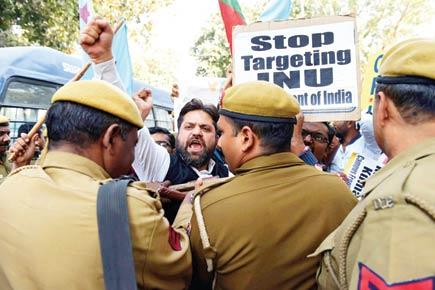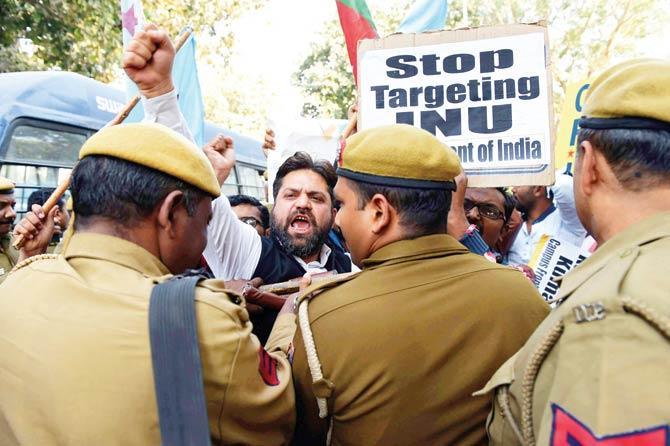The current debate on patriotism is keeping people conveniently engaged while the government struggles to do its job and fulfil its own promises

 What is one to make of this current argument about patriotism that has engulfed us suddenly? The new bone of contention is Afzal Guru, who was hanged on February 9, 2013 after President Pranab Mukherjee rejected his mercy petition. However, Guru is also an old bone of contention. For years, some people have argued that his role in the 2001 attack on Parliament was not properly proved. The Supreme Court, while sentencing him to death, also mentioned that “the collective conscience of the society will be satisfied only if the death penalty is awarded to Afzal Guru”. Some might consider this an odd argument, as courts are supposed to be ruled by laws and principles of justice and not mob fury.
What is one to make of this current argument about patriotism that has engulfed us suddenly? The new bone of contention is Afzal Guru, who was hanged on February 9, 2013 after President Pranab Mukherjee rejected his mercy petition. However, Guru is also an old bone of contention. For years, some people have argued that his role in the 2001 attack on Parliament was not properly proved. The Supreme Court, while sentencing him to death, also mentioned that “the collective conscience of the society will be satisfied only if the death penalty is awarded to Afzal Guru”. Some might consider this an odd argument, as courts are supposed to be ruled by laws and principles of justice and not mob fury.

Students and activists protest outside the office of HRD Minister Smriti Irani on Tuesday, against the previous day’s attack on Jawaharlal Nehru University (JNU) students in New Delhi. Pic/AFP
ADVERTISEMENT
Be that as it may, is anyone in this country really fooled by this explosion of this ‘national’ versus ‘anti-national’ argument all over again? A month ago, Rohith Vemula was anti-national because he was a Dalit who did not succumb to Hindutva politics or bow down to the caste system. Today, a students’ union leader of another university is ‘anti-national’ for opposing the death of Afzal Guru.
If there is anything in common between these two anti-national students — one who unfortunately took his own life and the other who’s in custody — it is those who call them anti-national. The Bharatiya Janata Party, and its larger Hindutva family, has, since it has come to power at the Centre in 2014, been focused on dividing India into us and them. The division is bogus but dangerous. It is founded on the premise that only the Sangh Parivar knows what nationalism is and everyone who is not part of this family is clearly anti-national. This is the same Sangh Parivar, by the way, which had almost no role to play in India’s freedom struggle and, in fact, supported British rule. But the less said about that the better.
Because that is not what this debate is about. In fact, in all likelihood, this debate has nothing to do with patriotism or nationalism or anything else. It is about ideology, flexing political muscle and most importantly, about deflection from what is happening. At one level, India’s education system is under attack. What started with Dinanath Batra’s idea of history and science has progressed to the current attempt to diminish free thought and diversity in Indian universities. In both Hyderabad and Delhi, there has been a clear attempt to give more clout and standing to the BJP’s student wing, the ABVP. Jawaharlal Nehru University has long upset India’s rightwing because it has been seen as too Marxist and too leftwing. Surely a government in power has the right to destroy JNU?
But even more than that, take a look at the country around you. A party came to power on an enormous mandate and promised better days to all. The election was fought on the personality and ability of one man — Narendra Modi. But the last 22 months have not quite fulfilled any of those promises or gone to plan. Industrialists who fully supported Modi and the BJP are muttering unhappily. The common man finds he has the same problems he did under the previous UPA government. Inflation and GDP figures are not looking good. The rupee has not recovered as promised. The Delhi and Bihar election results did not go as the BJP had hoped. Modi has talked a lot, delivered much less. ‘Good days’ has an empty sound that has become a joke for most people.
And that is why it is hardly surprising that we are now in the middle of an apparent war on issues as tenuous and impossible to pin down as ‘nationalism’, ‘patriotism’, ‘culture’ and so on. This is the refuge of governments that are struggling. We saw similar signs from the UPA government in its second term. We are seeing them from the NDA government much sooner than anticipated.
Is there any point in discussing democracy and dissent right now? You can disagree with those who support Afzal Guru without putting them in jail, beating them up and questioning their loyalty to the Indian flag. But then where would you get your smoke and mirrors from? And how would you attempt to fool all the people all the time?
Ranjona Banerji is a senior journalist. You can follow her on twitter @ranjona
 Subscribe today by clicking the link and stay updated with the latest news!" Click here!
Subscribe today by clicking the link and stay updated with the latest news!" Click here!







